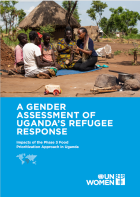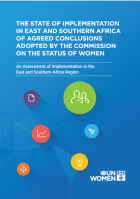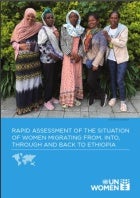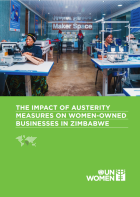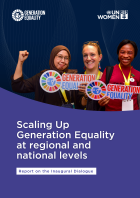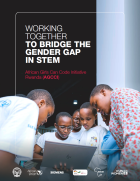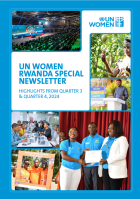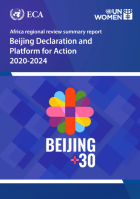Date:
The decision for women to migrate is multifaceted, driven by various factors, including the pursuit of economic, educational, and life opportunities and the need to escape conflict, environmental disasters, and deeply entrenched gender inequalities. Many migrant women in South Africa have fled violence or persecution in their countries of origin, including community and political violence, as well as experiences of rape and domestic abuse.
Date:
The UN has consistently underscored the importance of gender parity, establishing initial benchmarks as early as 1970 and reinforcing them through key frameworks such as the Beijing Declaration and the Sustainable Development Goals. Instruments like the UNCT-SWAP Gender Equality Scorecard and the Gender Parity Dashboard have been essential in tracking institutional progress. UN-Kenya’s Gender Parity Strategy builds on these commitments by fostering inclusive hiring practices, promoting equitable career growth, and creating supportive work environments. Anchored in extensive data collection including surveys, document analysis, and consultations with stakeholders, the strategy seeks to transform workplace culture and strengthen leadership responsibility. Its objectives include boosting team performance, lowering staff attrition, and ensuring balanced gender representation across all roles, particularly in more challenging field contexts. This integrated strategy is vital to advancing gender equality while enhancing the UN’s ability to respond effectively to diverse development challenges at both national and international levels.
Date:
Why does gender data matter? This publication highlights key insights from a high-level roundtable on closing gender data gaps in Africa and the Arab States. It explores challenges in data collection, media storytelling, and policymaking—while showcasing success stories. With actionable recommendations, it calls for stronger data systems to ensure women and girls are counted, heard, and empowered.
Date:
Taking into consideration Zimbabwe’s austerity-oriented macroeconomic policy trajectory, this study analysed 582 women-owned businesses across 10 provinces in Zimbabwe. Findings show that most of the businesses are informal, micro-sized, and survivalist with limited access to finance and markets. The study recommends gender-responsive policies, ease of doing business reforms, support for formalization, improving financial access, strengthening business development services, enhancing skills training and expanding export support.
Date:
This strategy, developed through stakeholder consultations in Karamoja, seeks to enhance community participation in humanitarian and development efforts. It addresses gaps in accountability and local capacity, proposing a collective, government-aligned approach over individual referral systems. Oxfam, UN Women, CDFU, and District Local Governments commit to implementing a collective Accountability to Affected Populations (AAP) mechanism. The strategy outlines four objectives (2025–2030): build community capacity, improve complaint systems, mainstream community perspectives, and strengthen engagement. It includes monitoring, risk mitigation, and sustainability plans. This calls for collaboration among UN agencies, NGOs, communities, and government for inclusive, impactful, and sustainable programming.
Date:
Sudan is experiencing one of the world’s worst humanitarian crises, two years into a devastating conflict that has far-reaching regional implications. A major consequence is the large-scale displacement of people to neighboring countries, with projections estimating over 4.8 million displaced by the end of 2025 if the conflict persists. Conflicts like these typically worsen existing social inequalities, especially gender disparities. Even before the current crisis, Sudan and surrounding countries such as Chad, South Sudan, and the Central African Republic (CAR) ranked poorly on the Gender Inequality Index (GNI), with scores of 0.55 for Sudan, 0.59 for South Sudan, and 0.67 for both Chad and CAR. These figures reflect limited access to education, healthcare, and political participation for women. The ongoing conflict is expected to deepen these disparities, highlighting the urgent need for gender-responsive humanitarian strategies to ensure inclusive support, protection, and long-term development for affected populations across the region.
Date:
The baseline survey assesses gender equality in Zimbabwe’s private sector, revealing low female representation in leadership, underrepresented professions, procurement, and share ownership. Only 20 per cent of CEOs and 25 per cent of directors are women. Few companies enforce gender policies or support women through procurement or CSR. The study recommends integrating gender equality into business strategies, improving enforcement, and supporting women-led enterprises through targeted programs, advocacy, and investment literacy.
Date:
The 'Gender and water (in)security in agricultural production in East Africa' focuses on the gender dynamics governing access to, use and control over rain water and irrigation used for productive livelihoods in agriculture in the countryside of Ethiopia, Kenya and South Sudan; how rural institutional arrangements and climate change impacts productive water use by women and men in agriculture, how gendered access to irrigation is impacted by the social norms that shape governance structures; and the policy responses needed to equitably respond to these gender challenges.
Date:
UN Women’s Low-Cost Biogas Project in Nigeria supports rural women with sustainable energy solutions, improving livelihoods and advancing climate resilience. By promoting biogas for clean cooking and income generation, the project contributes to reducing deforestation, unpaid care work, and greenhouse gas emissions, while creating green jobs and boosting women’s economic autonomy.
Date:
Uganda’s refugee policy is progressive, yet women and children remain highly vulnerable. Since 2022, food aid cuts have severely impacted female headed households. A gender assessment across eight districts highlights these challenges, showing the disproportionate effects on livelihoods, education, and protection. Key recommendations include promoting alternative livelihoods, improving education access, strengthening GBV support, enhancing food security measures, and fostering peaceful coexistence with host communities to ensure sustainable empowerment and gender-responsive aid.
Date:
The Commission on the Status of Women (CSW) monitors gender equality commitments and the Beijing Declaration. A study by UN Women East and Southern Africa assessed CSW63–CSW66, finding strong treaty ratification but weak policy implementation. Challenges include inadequate funding, weak national preparations, and limited African influence in CSW negotiations. Recommendations include strengthening coordination, enhancing stakeholder engagement, and improving CSO participation to boost Africa’s impact in global gender equality discussions.
Date:
The rapid assessment provides an analysis of the situation of women migrating from, to through and back to Ethiopia based on existing literature and a review of relevant policies, legal frameworks and services related to migration governance in Ethiopia, with a gender lens. The assessment also proposes recommendations to strengthen the rights of migrant women at all stages of migration.
Date:
Drawing on the policy brief on advancing the rights of Ethiopian migrant women domestic workers the infographic illustrates the risk and realities facing Ethiopian women migrating for domestic work at all stages including pre-departure, during the journey, at country of destination and upon return and provides insights for action.
Date:
This study examines the impact of Zimbabwe’s austerity measures (2018-2023) on women owned MSMEs. Most businesses are informal, survivalist, and struggle with financial exclusion, low capital, and limited government support. Only 2 per cent export due to financial and logistical barriers. The study recommends gender-responsive policies, business formalization, financial inclusion, skills training, and export support to improve economic opportunities for women entrepreneurs.
Date:
In Uganda, significant strides have been made toward gender equality, yet challenges persist. A robust policy framework exists, but inequality and gender-based violence remain prevalent. To address these issues, a collaborative campaign has been initiated by female heads of diplomatic missions and UN agencies, and male changemakers from various sectors including the Government of Uganda.
Date:
The transition to a low carbon economy is leading to important socioeconomic transformation in sub-Saharan Africa. The green transition can help governments align their development strategies. Gender equality and women’s and youth employment are critical priorities. This toolkit helps stakeholders involved in the process of formulation or revision of climate change and green policies (i.e. NDCs or NAPs) to identify opportunities to maximize co-benefits of gender equality and climate action.
Date:
This report summarizes the discussions, outcomes, and recommendations from the Generation Equality Dialogues “Advancing Generation Equality Through Local Action: Scaling up Generation Equality at national and regional levels” held on September 12, 2024.
Date:
This report showcases the transformative journey that the AGCCI alumni in Rwanda have embarked on, paving way to becoming the innovators and change makers of the present and future.
Date:
This newsletter highlights some of UN Women`s key milestones made in advancing gender equality and women`s empowerment in Rwanda in the period of July - December 2024
Date:
The message that "Women’s rights are human rights" was strongly affirmed in the 1995 Beijing Declaration and Platform for Action (BPfA). Serving as a roadmap, the BPfA outlined clear objectives to tackle 12 critical issues impacting women and girls, including education, health, economic empowerment, political participation, and human rights. As the world marks the 30th anniversary of the BPfA in 2025, it serves as a solemn reminder that, despite progress, we are still far from fully achieving its goals.










